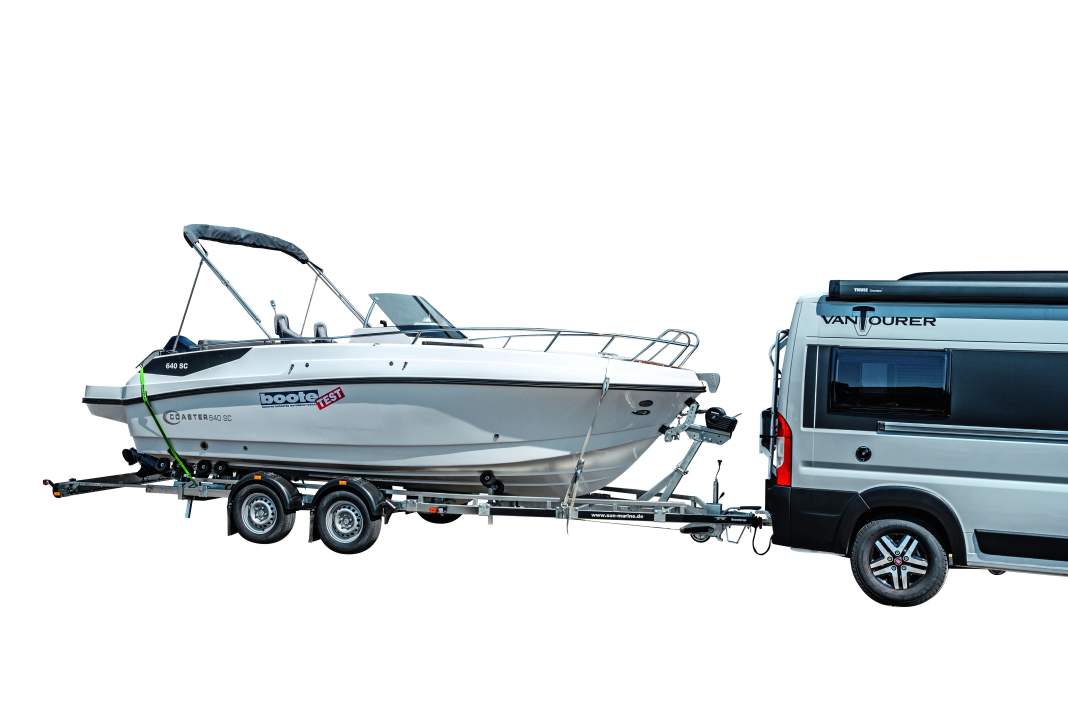





When purchasing a boat trailer, it is important to choose the right size and load capacity to ensure that the trailer can safely carry the weight and dimensions of the boat. Individual attention should also be paid to ensuring that the trailer is suitable for the respective use in order to guarantee a long service life and reliability. Depending on the hull type of the boat, a different type of trailer is required. Because a boat is always craned due to the lack of a slipway or because you don't want to sink the trailer in salt water, different support points are available. Long supports often offer significantly better weight distribution than rollers, as they absorb the forces much better and distribute the load over a larger area. The relatively small pressure point of a roller often leads to cracks in the gelcoat and permanent damage to the polyester on uneven roads and with frequent trailering. When buying a boat trailer, it is therefore highly advisable to seek advice from a specialist dealer to ensure that it really is the right trailer for your individual needs. Because if you buy cheap, you often buy twice.
Support from the dealer
The respective dealer can help to determine the correct size, load capacity and equipment of the trailer to ensure that the requirements also correspond to the use of the boat. If a boat trailer is often used for slipping, for example, you should always make sure that the wheel hubs are waterproof. Trailer maintenance should also be carried out at regular intervals in order to recognise or prevent damage at an early stage.
As with cars, more and more owners are attaching great importance to a harmonious overall package. Many dealers have therefore been offering custom-made trailers in boat colours for several years. However, the visually appealing powder coating can often be vulnerable, for example if the top layer is damaged by impact. Unfortunately, blooming after contact with water can quickly make the trailer unsightly. Corrosion on contact with salt water is even more extreme. The salt immediately attacks even the smallest scratch or blemish on the coated trailer. The hot-dip galvanisation of the steel trailer is much more grateful here.
Choice of material for the trailer
The first question when choosing a trailer is often the material. You can usually choose between galvanised steel or aluminium. A rarity on the market is the stainless steel version from the Dutch company Vanclaes. Aluminium is significantly lighter than steel, which means that the payload of the trailer is higher in direct comparison. However, as aluminium has a significantly higher raw material value, you have to spend a much larger sum on the purchase, whether new or used.
The 2-tonne trailer class always has two axles, as the maximum load capacity of a single axle is 1800 kilograms. Generally speaking, the smooth running and tracking stability of tandem trailers is always clearly superior to single-axle trailers. However, a distinction must also be made here with regard to the material. Due to the noticeably more stable and stiffer material, a steel trailer often runs a little more unevenly when driving in tandem than an aluminium trailer, which is much more torsion-resistant. However, the life expectancy of a steel trailer is therefore usually significantly longer than that of its aluminium competitor.
Optional accessories for the boat trailer
There is a wide range of optional accessories to choose from - a belt winch offers potential weight savings with the same stability. Dipsticks at the end of the trailer enable targeted and straight loading and give inexperienced skippers a little more security.
If you have to pay attention to every kilo of the trailer due to the towing capacity specified by the towing vehicle, you should do without convenient accessories such as walkways on the trailer or additional storage boxes. Although crank supports are helpful for keeping the boat straight on the trailer, they also contribute to decimating the payload with the weight of the spindles. In order to save weight and thus increase the payload, some manufacturers are already using plastic add-on parts such as mudguards.
All add-on parts such as axles and towing heads are often identical for the different trailer manufacturers, as they are supplied by the same producers.
The selection in the 2 tonne segment is relatively large, but still manageable. In the following overview, we present the models currently available on the market.

